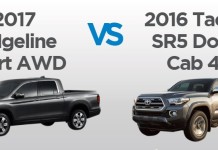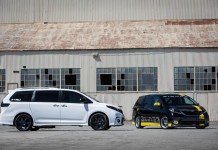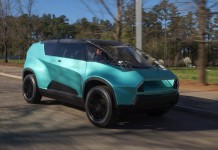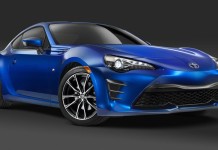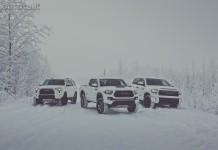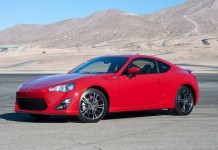Since its 2000 introduction, the Toyota Tundra has served mainly recreational pickup truck buyers. Not quite full-size in dimensions or work capacity, the original Tundra appealed to those seeking an easy-to-drive commuter vehicle capable of handling weekend trips to the hardware store.
But with the Tundra’s smallish V8 and low tow rating, Toyota was hard-pressed to attract more serious truck people, namely independent contractors and those who haul heavier payloads and trailers. So these shoppers continued to buy the larger, stronger domestic-brand entries. That’s likely to change in 2007. Toyota has completely redesigned the Tundra, creating a truck of true full-size proportions. With a fully boxed frame, three cab sizes, three bed lengths and three engines, including a new 5.7-liter V8, the 2007 Toyota Tundra stands on equal footing with all of the traditional Big Three pickups.
With the wider variety of configurations, it’s much easier to equip a 2007 Tundra for dual use as a work-site vehicle and family hauler. The medium-size Double Cab, which is now the extended-cab version of the Tundra, is as large as many competitors’ crew cabs, while the massive Tundra CrewMax has the roomiest crew cab in the full-size segment, surpassing even Dodge’s MegaCab in this regard. Although the CrewMax comes with only a 5.5-foot bed, Toyota gives Tundra Regular Cab and Double Cab buyers the option of either a 6.5-foot or 8-foot bed — a level of flexibility previously seen only from the domestic manufacturers. You’ll find items like a six-speed automatic transmission, stability control and side curtain airbags on the standard equipment list of all ’07 Tundras, while useful features like a bed rail system (with adjustable tie-down cleats), extendable towing mirrors and a backup camera are on the options sheet.
Any way you look at it, the 2007 Toyota Tundra is a remarkable truck, excelling in all the areas in which its predecessor fell short. For full-size truck buyers with serious towing and hauling requirements, it’s a must-drive: It’s just as quick (and in many cases, quicker) than its competitors, including the Chevrolet Silverado/GMC Sierra twins, Dodge Ram, Ford F-150 and Nissan Titan, and its six-speed transmission gives it an advantage over many of these trucks when there’s a trailer hitched to the back. It also boasts generous interior room and a wide availability of features.
For those who need a full-size truck that’s durable enough to take a beating, as opposed to a comfy daily driver, the 2007 Toyota Tundra is certainly one of the top contenders in the half-ton class. However, in Toyota’s bid to go after the hard-core crowd, the company risks putting off buyers who liked the original Tundra’s easygoing demeanor. While the new truck’s road manners are polished, it feels much bigger behind the wheel and it doesn’t hold a significant advantage over its peers in the ride and handling department. It’s generally comfortable and quiet, but by no means does it drive like a Camry. In addition, compared to the upscale interior treatments in GM’s pickups, the Tundra’s cabin comes off as plasticky and utilitarian. Depending on your priorities, you may want to shop around a bit before buying a Tundra.
Body Styles, Trim Levels, and Options
A full-size half-ton truck, the 2007 Toyota Tundra comes in Regular Cab, Double Cab and CrewMax body styles. The Double Cab is essentially a large extended cab with four forward-hinged doors, while the Tundra CrewMax is an extra-large crew cab. Regular and Double Cabs can be ordered with either a 6.5-foot or 8-foot bed, while the CrewMax comes with only a 5-foot bed. The standard-cab truck comes in a single DX trim level, while the Double Cab and CrewMax are available in SR5 and Limited trim levels.
The DX starts you out with 18-inch steel wheels, a 40/20/40 cloth bench seat, dual-zone air-conditioning and a four-speaker CD stereo with an MP3 player input jack. The SR5 adds chrome bumpers, additional front-seat adjustments, an extra pair of stereo speakers, cruise control, full power accessories, keyless entry and rear heater ducts. Long-bed versions of the Double Cab SR5 also get towing preparation (which includes a tow/haul mode for the transmission and manually extendable exterior mirrors), and CrewMax SR5 models get heated mirrors, rear A/C ducts, a reclining rear bench seat and a sliding rear window with a defroster. Tundra Limited models add alloy wheels, slightly wider tires, a bed rail system with adjustable tie-downs, leather upholstery, front captain’s chairs with 10-way power adjustment for the driver, a telescoping steering wheel, automatic climate control, a 10-speaker JBL sound system with an in-dash CD changer, Bluetooth and power-retractable exterior mirrors with an auto-dimming feature. (Note that Limited CrewMax models get an extra pair of audio speakers for a total of 12.)
Major options include a navigation system, a backup camera, 20-inch wheels and, on the CrewMax only, a sunroof. The TRD Off Road Package provides an upgraded suspension with Bilstein shocks, BFGoodrich all-terrain tires and foglamps. An appearance package is available for Regular and Double Cab buyers seeking a monochromatic look.
Powertrains and Performance
Three engines are available on the 2007 Toyota Tundra half-ton truck. Standard on the Tundra Regular Cab and standard-bed Double Cab is a 4.0-liter V6 rated for 236 hp and 266 pound-feet of torque. Optional on these models and standard on all other Tundras is a 4.7-liter V8 capable of 271 hp and 313 lb-ft of torque. Optional across the line is a much stronger 5.7-liter V8 good for 381 hp and 401 lb-ft of torque.
The base V6 and 4.7-liter V8 use a five-speed automatic transmission. With either of these engines, your Tundra will have a 3.91 rear axle ratio unless you get the towing package, which provides a 4.10 ratio. The big V8 is paired with a six-speed automatic; 4.10 rear gears are standard and the tow package comes with a 4.30 ratio. All versions of the Tundra can be equipped with two-wheel drive or four-wheel drive, and all trucks come with a limited-slip rear differential. A properly equipped 4×2 Tundra Regular Cab can tow up to 10,800 pounds. The Tundra’s maximum Gross Combined Weight Rating or GCWR (the total weight of the vehicle, including trailer, cargo, passengers and fuel load) is 16,000 pounds.
Safety
All 2007 Toyota Tundras come with antilock disc brakes, traction and stability control, front-seat side airbags and full-length side curtain airbags. The Tundra Regular Cab (which has no rear seat) has a manual cut-off switch for the passenger-side front airbag.
Interior Design and Special Features
Although Limited models have electroluminescent gauges, the emphasis is on utility and durability inside the Tundra’s cabin. The front seats are wide and accommodating, storage areas and cupholders are generous in size and quantity, and build quality is tight. Soft-touch surfaces are few and far between, though the consistent graining on the plastics lends the cabin a cohesive feel. Although attractive, the individual binnacle gauges are not as easy to read as they should be. The center stack controls are large and well organized, but particularly in Tundras with the navigation system, they’re mounted too far to the right to allow for easy reach from the driver seat. Regular Cabs offer comfortable seats as well as a considerable amount of interior cargo space behind the seats. In Double Cabs, the backseat is fully usable for adults and front-hinged rear doors allow for easy entry. The CrewMax offers the roomiest rear-seat accommodations in the entire pickup truck class. With 44.5 inches of rear legroom, even 6-footers can stretch out and cross their legs.
Driving Impressions
Equipped with the 5.7-liter V8, the 2007 Toyota Tundra is ridiculously powerful and the engine’s delivery is impressively smooth. Shifts from the six-speed automatic transmission are prompt, and the console shifter is precise in its action, allowing drivers to make full use of the manual mode on highway grades and in off-road situations. We timed a 5.7-liter V8-equipped Tundra Double Cab at a stunning 6.3 seconds for the 0-60-mph acceleration run.
Like most of today’s half-ton trucks, the Tundra provides a smooth and quiet highway ride, although trucks with the off-road package tend to feel choppy over rain-grooved expressway pavement. Light, precise steering makes for easy maneuvering in the parking lot, but some buyers may find it a bit too light at highway speeds. Handling is predictable around corners and body roll is well-contained. Unlike the previous-generation Tundra, though, this truck never stops feeling like a large vehicle and doesn’t hold a significant advantage over competitors like the Silverado, F-150, Ram or Titan. Braking ability is a strong point of the new Tundra, as it provides a firm, progressive pedal feel and respectable stopping distances, with minimal fade under heavy use.
| Exterior |
| Length: 209.8 in. | Width: 79.9 in. |
| Height: 75.8 in. | Wheel Base: 126.8 in. |
| Ground Clearance: 10.2 in. | Curb Weight: 4610 lbs. |
| Gross Weight: 6200 lbs. |
| Interior |
| Front Head Room: 40.2 in. | Front Hip Room: 63 in. |
| Front Shoulder Room: 66.7 in. | Front Leg Room: 42.5 in. |
| Maximum Seating: 3 |
| Performance |
| Base Number of Cylinders: 6 | Base Engine Size: 4 liters |
| Base Engine Type: V6 | Horsepower: 236 hp |
| Max Horsepower: 5200 rpm | Torque: 266 ft-lbs. |
| Max Torque: 4000 rpm | Maximum Payload: 1590 lbs. |
| Maximum Towing Capacity: 5100 lbs. | Drive Type: RWD |
| Turning Circle: 39.2 ft. |
| Fuel |
| Fuel Tank Capacity: 26.4 gal. | |
| EPA Mileage Estimates: (City/Highway) |
| Automatic: : 17 mpg / 20 mpg | |
| Range in Miles: (City/Highway) |
| Automatic: 448.8 mi. / 528 mi. | |
Source: Toyota via Edmunds

